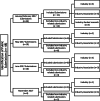Industry strategies in the parliamentary process of adopting a sugar-sweetened beverage tax in South Africa: a systematic mapping
- PMID: 33302993
- PMCID: PMC7725882
- DOI: 10.1186/s12992-020-00647-3
Industry strategies in the parliamentary process of adopting a sugar-sweetened beverage tax in South Africa: a systematic mapping
Abstract
Background: In 2016, the South African government became the first in the African region to announce the introduction of an SSB tax based on sugar content as a public health measure to reduce obesity. This tax was introduced against the backdrop of South Africa having a large sugar production and SSB manufacturing industry, as well as very high unemployment rates. The introduction of fiscal measures, such as a SSB tax, has been met with well-coordinated and funded opposition in other countries.
Methods: The aim of this study is to describe and analyse the arguments and strategies utilised by industry during policymaking processes to oppose regulatory actions in LMIC. This study analyses arguments and strategies used by the beverage and related industries during the public consultation phase of the process to adopt the South African SSB tax.
Results: Industry opposition to the SSB tax was comprehensive and employed several tactics. First, industry underscored its economic importance and the potential job losses and other economic harms that may arise from the tax. This argument was well-received by policymakers, and similar to industry tactics employed in other middle income countries like Mexico. Second, industry discussed self-regulation and voluntary measures as a form of policy substitution, which mirrors industry responses in the US, the Caribbean and Latin America. Third, industry misused or disputed evidence to undermine the perceived efficacy of the tax. Finally, considerations for small business and their ability to compete with multi-national corporations were a unique feature of industry response.
Conclusions: Industry opposition followed both general trends, and also introduced nuanced and context-specific arguments. The industry response experienced in South Africa can be instructive for other countries contemplating the introduction of similar measures.
Keywords: Corporate political activity; Public policy process; SSBs; South Africa; Sugar tax; Sugar-sweetened beverage tax.
Conflict of interest statement
The authors declare that they have no competing interests.
Figures
References
-
- Morenga LT, Mallard S, Mann J. Dietary sugars and body weight: systematic review and meta-analyses of randomised controlled trials and cohort studies. BMJ. 2013 15 [cited 2020 Apr 14];346. Available from: https://www.bmj.com/content/346/-bmj.e7492. - PubMed
Publication types
MeSH terms
Substances
LinkOut - more resources
Full Text Sources
Miscellaneous


